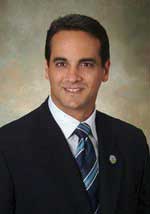By Joseph A. Curtatone (The opinions and views expressed in the commentaries of The Somerville News belong solely to the authors of those commentaries and do not reflect the views or opinions of The Somerville News, its staff or publishers.) So, Boston is planning an iPhone application that lets some residents send pictures of municipal problems to the Mayor's Office of Constituent Services for follow-up. That's an interesting concept and I will look forward to seeing it in action. But I have to say I'm concerned about the long-term prospects for the new application, because Boston has never built up the constituent service infrastructure to deliver the timely coordination, tracking, responsiveness and accountability needed to support this new technology. (And I'm also worried because it won't work unless you have an iPhone: Verizon, Sprint and Cingular customers need not apply.) It'll be cute, but will it be widely adopted and successful without a full-blown 311 and stat program to back it up? Boston has so far shied away from such programs. Meanwhile, over in Newton, SomerStat has become an issue in the budget debate and the mayoral campaign. An independent Citizens Advisory Group has recommended that Newton start developing a "stat"-style performance management program on the Somerville model (which we adapted from the Baltimore CitiStat model), but some aldermen are resistant to adding analytical staff to the mayor's office. By contrast, all four candidates to replace outgoing Newton Mayor David Cohen have endorsed the performance management concept and are now arguing about who would be best qualified to make it work. Given the great results for Somerville and other communities that have adopted 311 and stat programs, you might wonder why some local elected officials remain so resistant to these cost-effective innovations. In both Boston and Newton, one possible explanation is "Not Invented Here" (NIH) syndrome. If you look up "Not Invented Here" on Wikipedia, here's what you'll find: "a term used to describe persistent social, corporate or institutional culture that avoids using or buying already existing products, research or knowledge because of its different origins. It is normally used in a pejorative sense." Harvard Business School professor Henry Chesbrough says that a crucial key to success in our technology-driven era is to take the opposite approach, which he calls "open innovation." That's why Somerville is so willing to borrow best practices from other municipalities and adapt them to the needs of our community. A good idea is a good idea, wherever it comes from – and we shouldn't be shy about giving credit to others, and sharing ideas we know can work. In fact, one of the reasons that Somerville was named a 2009 All-America City (like "President Barack Obama," "2009 All-America City" is a phrase I never get tired of repeating) is that we have taken good ideas from other communities and made them our own in ways that hold lessons for other small and mid-sized cities across the state and nation. For example, prior to our adoption of the 311 concept in 2006, it was considered to be a service that only the biggest cities could deliver: it had a multi-million dollar price tag and required expensive proprietary software. Similarly, the "stat"-style performance management program, which collects and uses data to manage allocation of service resources in real time, was once considered too technically complex and analytically demanding to be deployed in communities that lacked sophisticated IT and number-crunching resources. I was still an alderman back in 2003 when I saw Baltimore's CitiStat and 311 programs in action (Baltimore's Mayor at the time was Martin O'Malley, who is now Maryland's Governor). I immediately recognized their potential to make Somerville government more efficient, more accountable, and more transparent – and I made them part of my campaign platform. Six years later, I can say that the success of these programs has exceeded even my high expectations. SomerStat has transformed our budget process. It has helped us create a goal-based budget with measurable goals and outputs, giving our Board of Aldermen and our resident more ability to scrutinize and understand the way we spend money. In good times, SomerStat has helped us expand services while controlling costs. Today – even in the midst of a serious state and national fiscal crisis – it's helped us cut spending while reallocating resources to preserve core services. At the same time, 311 has become the cornerstone of all our customer service programming. Back in January of 2006, it started out as a service that tracked resident inputs to only one department: Public Works. It only worked with landlines (no cell phones), had full operational capacity only in the daytime and had limited language capacity in Spanish and Portuguese. Today, 311 works from any phone in Somerville, including mobile phones; it provides service in English, Spanish, Portuguese and Haitian Creole; it fully supports DPW and Traffic and Parking while handling most constituent queries for Inspectional Services, the City Clerk's Office and many other City Departments. 311 representatives staff the very popular Welcome Desk at the entrance to City Hall and they update the City's award-winning website. But best of all, 311 tracks the nature and the outcome of thousands of requests for information and service each month, providing a vital stream of data to SomerStat, and helping senior managers throughout City government (and taxpayers and their elected leaders) hold government more accountable to the residents they serve. And 311 does all these things for less than $600,000 per year – less than four tenths of one percent of the City's budget. That's a great achievement and a terrific bargain – even if it wasn't invented here. |
|||













Reader Comments